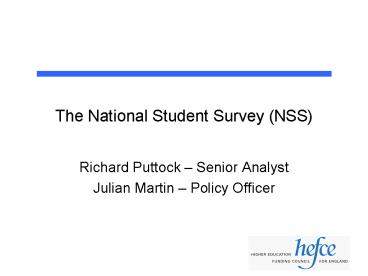The National Student Survey (NSS) - PowerPoint PPT Presentation
1 / 17
Title:
The National Student Survey (NSS)
Description:
The National Student Survey (NSS) Richard Puttock Senior Analyst Julian Martin Policy Officer How did TQI come about ? Up until 2001, QAA assessed teaching ... – PowerPoint PPT presentation
Number of Views:154
Avg rating:3.0/5.0
Title: The National Student Survey (NSS)
1
The National Student Survey (NSS)
- Richard Puttock Senior Analyst
- Julian Martin Policy Officer
2
How did TQI come about ?
- Up until 2001, QAA assessed teaching quality at
each department (statutory duty) - In 2001 it was agreed to move to a new system of
QAA institutional audit and TQI - New quality arrangements based on
- Institutions autonomy and responsibilities
- Lightness of touch
- Informing stakeholders
3
Whats included on the TQI website?
- Quantitative data on
- Qualifications on entry
- Continuation
- Achievement
- Destinations
4
Whats included on the TQI website?
- Qualitative data
- External examiner report summaries
- Internal review report summaries
- Student feedback
5
How did NSS come about ?
- Desire to include student voice
- Investigation to see whether HEIs own student
feedback would be suitable for publication - Concluded that a new survey needed
- Extensive NSS pilot carried out
6
The Questionnaire
- 21 closed questions in 6 areas
- Teaching quality
- Assessment and feedback
- Academic support
- Organisation and management
- Learning resources
- Personal development
- One summative question
- 2 open ended questions
7
Survey process
- Target list generated from HESA records
- Survey agency collected contact details
- Survey agency attempted to contact students
- E-mail/website
- Post
- Phone
- Opt-out available
8
Survey progress
- Started contacting students in January
- Main survey phase nearly complete
- Current overall response rate 56
9
Outcomes
- Results will be
- published on the TQI site
- Fed back to institutions/SUs
- The Survey will be reviewed and assessed
- Analysis of the overall results will be carried
out and disseminated to the academic community
10
Effects of using HESA data
- Advantages
- Consistent coverage one algorithm all HEIs
- Less burden on HEIs
- Disadvantages
- Students may not always be in final year
- Relies on good data from HEIs
11
Crucial HESA fields (1)
- Course length (SPLENGTH/UNITLGTH)
- Year of Programme (YEARPRG)
- Start date (COMDATE)
12
Crucial HESA Fields (2)
- FTE (STULOAD)
- Source of funding (FUNDCODE/MSFUND)
- Special students (SPCSTU)
- Qualification aim (QUALAIM)
- Subject of qualification aim (also TQI)
13
Changes for 2006
- Target lists generated by HESA during collection
- Type D exclusions not allowed
- Explicit exclusion of one year PT courses
- Simplification of expected end algorithm
- Probable exclusion of students included in 2005
survey
14
Presentation of data (1)
- Based on subject groups (41 default)
- Basket metaphor
- Initially 6 scales plus overall satisfaction
- Question level detail available
15
Presentation of data (2)
- Require 30 responses
- Require 50 of students to respond
- If data not available offer at next level up
16
Timetable for remainder of 2005 Survey
- Early-April preview of student allocation to
cells - Mid-April survey work completed
- Early July results preview via IPSOS
- Late August preview via TQI
- Early September launch on TQI
- September Detailed feedback to HEIs
17
Any Questions ?
- www.tqi.ac.uk
- www.thestudentsurvey.com































